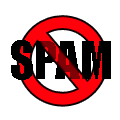
"SPAM" is the sending of
unsolicited commercial e-mail, or the posting of commercial advertisements to
Usenet newsgroups which do not specifically allow advertising. Sitelutions has
absolutely NO tolerance for SPAM. Here's why we think SPAM is bad: - The receiver has to pay
for the SPAM: Unlike traditional print advertisements, the receiver of
SPAM messages is forced to pay for receiving it? How? For one, it
costs the recipient's ISP money. ISPs are forced to raise user's prices
because of the high cost of SPAM received. SPAM also typically takes up
disk space on the ISP's servers, as well as the recipient's hard drive.
In addition, it takes the recipient a good deal of time to delete dozens of
SPAM messages per day, and time is money.
- There's just too much of
it: If you're like most internet users, you receive between 25 and 50 SPAM
advertisements per day. Many users report receiving over 100 messages
per day. It takes even a computer-savvy professional at least a few
minutes to weed through this much SPAM. It also causes some Internet
users to inadvertently delete legitimate messages from friends.
- No "real" way to
unsubscribe: While some spammers claim that you can be removed from their
lists by e-mailing them an "unsubscribe" message, in most cases this is far
from the truth. Usually, spammers do not even read or receive messages
sent to the address that they provide. In cases where they do, they
often use your response as confirmation that your e-mail address is valid.
Because of this, in many cases, you'll be sent more SPAM, since spammers learn
that you are a "real" person, and that you are receiving their messages.
- It's mostly garbage: Most products and services advertised via SPAM are usually bogus. In
general, it has been found that most SPAM messages contain deceptive and
fraudulent advertisements. Those with good business sense and good
products need not rely on SPAM as a method of advertising.
- The blame game:Many spammers attempt to relay SPAM through free services, such as Yahoo!
mail, hotmail, and other free mail providers. Other spammers do the same
using their dialup ISP account, for which they pay $10-$20 per month.
Just a single SPAM message can cost an ISP far more than $20 per month.
Many recipients of SPAM, without understanding the actual path of the SPAM,
will take legal action against ISPs that host (or provide DNS) for the "spamvertized"
site. In most cases, this ISP had nothing to do with the SPAM, and shuts
down the spammer's site ASAP.
Sitelutions has a VERY
STRICT anti-spam policy. Members found guilty of sending SPAM via
Sitelutions, or sending SPAM to advertise their Sitelutions-hosted, Sitelutions-redirected,
or Sitelutions-DNS-based site will be investigated immediately. Typically,
when we receive more than one SPAM complaint from a different source regarding a
single user, we suspend or terminate that user's account immediately. Put simply, sending SPAM is
just plain stupid. It's a waste of everyone's time, including that of the
spammer, since SPAM usually generates little to no response. We completely
disapprove of SPAM, and we will do everything in our power to enforce our
anti-spam policy. Contact Us
If you have received SPAM from one of our users, or advertising a site hosted by
Sitelutions, please first contact
[email protected]. We ask that you contact us directly, and do not
contact our service providers unless you do not receive a satisfactory response
from us. Why? It creates more of a headache for us and more of a
headache for our service providers. We're always capable of resolving SPAM
problems by terminating the accounts of users that SPAM. There is usually
no reason to contact our upstream bandwidth providers.
We typically respond immediately to SPAM complaints, but we ask that you give us
48 hours before contacting our service providers. Links
Here are some links to anti-SPAM sites. We think you may find them of
interest. | 



